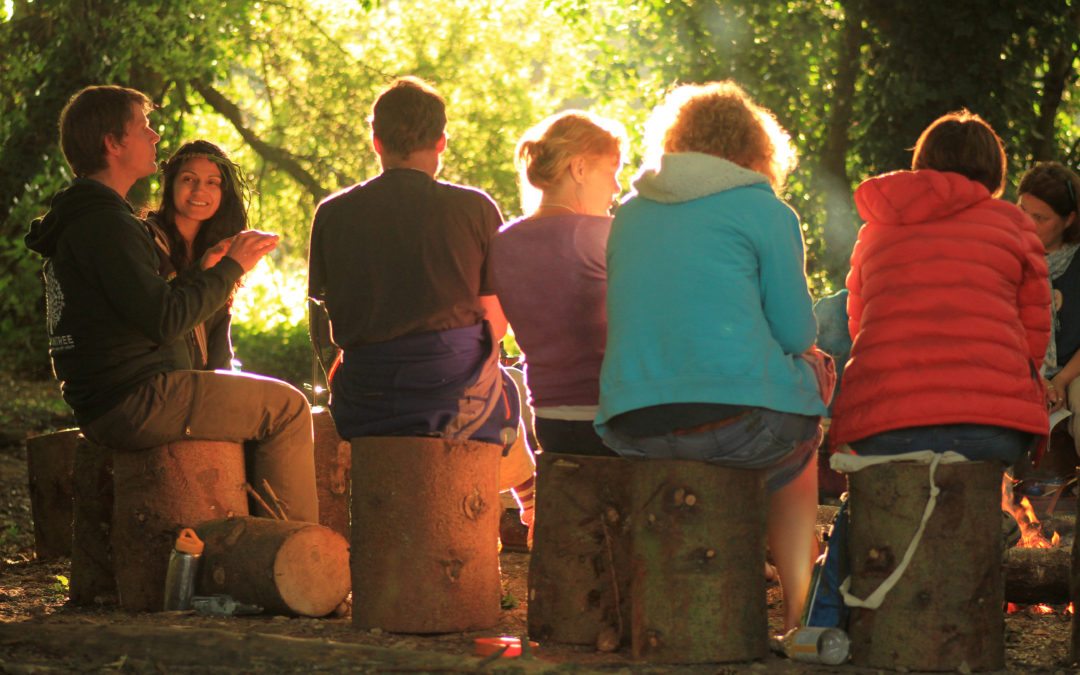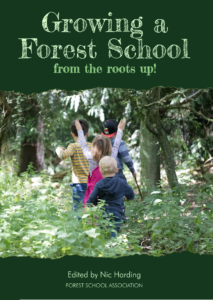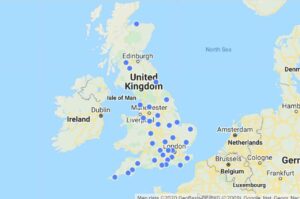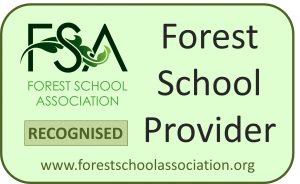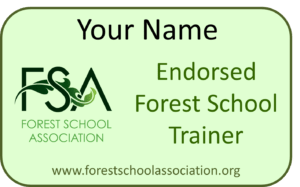Workshops attended by Jen Hurst, Sylva Foundation and Oxfordshire Forest School Leader
Workshop 1: Wellbeing Assessment Handouts by Jon Cree
Measuring Wellbeing Workshop Handout ![]()
Existing Methods to Measure Social Outcomes ![]()
The Challenge of Defining Wellbeing ![]()
Workshop 7: Sit spots for well being with Dr Chris Walton and Mell Harrison [SUNDAY]
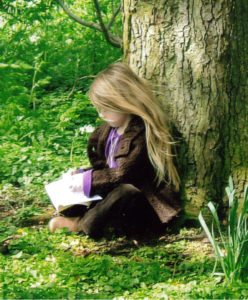 Mell and Chris introduced us to the theory, practice and value of ‘Sit Spots’ also known as ‘Magic Spots’ in this workshop set in glorious meadow and woodlands. Through Mell’s own extensive Forest School practice and Chris’ PhD research on the topic of sit spots, we learnt that sitting alone in nature in silence for a certain period of time is valuable for young people and adults of all ages. The impact of sit spots is clear – Chris’ research showed that out of 3000 children who had taken part in Forest School activities (including sit spots), when asked what their favourite experience was 60% said sit spots. In addition 50% of the children in his research said they still found a place to do a sit spot on their own at least once a week outside of Forest School.
Mell and Chris introduced us to the theory, practice and value of ‘Sit Spots’ also known as ‘Magic Spots’ in this workshop set in glorious meadow and woodlands. Through Mell’s own extensive Forest School practice and Chris’ PhD research on the topic of sit spots, we learnt that sitting alone in nature in silence for a certain period of time is valuable for young people and adults of all ages. The impact of sit spots is clear – Chris’ research showed that out of 3000 children who had taken part in Forest School activities (including sit spots), when asked what their favourite experience was 60% said sit spots. In addition 50% of the children in his research said they still found a place to do a sit spot on their own at least once a week outside of Forest School.
Eager to have our own sit spot experience Mell and Chris then led us through sensory activities making plant cocktails to smell, and blind fold games to ‘meet a plant’. The importance of these activities in providing a transition for the children from the classroom into nature was emphasised; a gentle and engaging journey is vital to awaken their senses and allow time to prepare for the sit spots. We were introduced to ways of starting and ending sit spots that could become part of a routine in regular sessions, and then we were shown to our own sit spot places in the magical woodland. My own sit spot is still glowing green and gold in my mind’s eye and one I will never forget. We reflected on our role as Forest School practitioners; to facilitate sit spots and “accompany children in their silence” with no intervention, and to truly practice sit spots effectively with our groups we must first make them a part of our own lives. We all left feeling touched and inspired by the magic of sit spots!
Workshop 8: Great Forest Bake Off with Mell Harrison [SATURDAY]
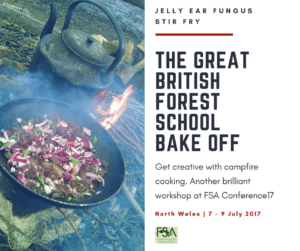 Mell’s magic glittery smelling potion was dabbed on our noses and then we all plunged into the abundant meadow scratching, sniffing and scrunching the plants with whoops of delight and gasps of surprise. We learnt the culinary and medicinal uses of plantain, clover, dandelion and various flowers. Armed with baskets of these plants Mell then gave us the Great Forest School Bake Off challenge: to create a three course meal in 45 minutes, each dish to include wild ingredients and to be presented to the judges with flare and beauty. In groups we soon organized ourselves into the fire starters, the choppers, the chefs and the designers, brainstorming wild ideas and experiencing the emotional roller coaster of time pressure – all with good humour and fabulous team work that is the hallmark of Forest School Leaders.
Mell’s magic glittery smelling potion was dabbed on our noses and then we all plunged into the abundant meadow scratching, sniffing and scrunching the plants with whoops of delight and gasps of surprise. We learnt the culinary and medicinal uses of plantain, clover, dandelion and various flowers. Armed with baskets of these plants Mell then gave us the Great Forest School Bake Off challenge: to create a three course meal in 45 minutes, each dish to include wild ingredients and to be presented to the judges with flare and beauty. In groups we soon organized ourselves into the fire starters, the choppers, the chefs and the designers, brainstorming wild ideas and experiencing the emotional roller coaster of time pressure – all with good humour and fabulous team work that is the hallmark of Forest School Leaders.
Then came judgement time! Nervously we announced our creations to serious faced judges. Bravely they sipped and munched their way through mini restaurants such as ‘Black Forest Gastro’ and ‘the Wild Wonder’. Battered clover flowers competed with chocolate pancakes and wild cherry sauce, plantain leaves appeared in stuffed courgette and smashed frittatas…the array of dishes was astounding! We worked hard, we had fun, we learnt new skills and shared ideas. But most of all we were nurtured and made to feel so special by Mell’s amazing preparation, planning, care and attention to the smallest details. The woodland was beautifully laid out with all the resources we needed, just like the marquee in the real Bake Off on TV! Nothing was too much trouble – Mell and Chris were always there to help. With kindness, grace and much thought Mell empowered us to do the impossible, and modeled how we could also do this ambitious and fun activity with our groups. It was the workshop I needed to move me on from my cooking rut of popcorn and damper bread, but more importantly it was the workshop I needed to remind me that when we work together…our potential is infinite.
Workshop 16: Social Value with Eleri Lloyd, from Social Value Cymru [SATURDAY]
What is the social value of Forest School? As Forest School Leaders we are often asked to explain the importance of Forest School, and then ‘prove’ the social impacts of Forest School to funders and those that need to see concrete evidence. This workshop came to the rescue by providing some very easy to use methods to help us in the Forest School world! Eleri began by explaining what Social Value means – basically the social outputs and outcomes produced by changes that are made to people’s lives. So at Forest School we might ask participants what has changed in their lives as a result of going to Forest School, and why? To structure this information Eleri introduced us to the ‘Theory of Change’, a step by step process that can help us work out if the activity we are doing is effective. This process can be helpful in writing an application for funding and/or reporting. So in our case the activity would be Forest School sessions:
Step 1 Identify Inputs: These are things needed to do the activity – in our case time of the Forest School Leader, cost of Forest School Leader, a woodland site, equipment and maybe transport.
Step 2 Identify Outputs: These are things that happen because of the activity and are quantitative (ie. can be measured or counted). At Forest School this could be the number of children who attend Forest Schools, the number of sessions etc.
Step 3 Identify the Outcomes: These are things that may be intended or unintended changes as a result of the input and may be more long term. They are often qualitative (ie. descriptive). For Forest Schools an outcome may be greater motivation of young people in the classroom or it could also be the school saving money by having a Forest School on site rather than the children having expensive one off trips off site. To capture the outcomes a survey or interview could be done with stakeholders (the people involved in the project).
Step 4 Longterm impacts: Sometimes we forget that the activity we are doing has far reaching impacts. For example Forest School can bring the school community closer by engaging parents in helping at sessions.
Eleri emphasised that all outcomes should be recorded, both the good and the not so good so that the reality can be captured. She also said it was helpful to imagine the activity or change we are making is like a pebble dropped into water – and the outputs and outcomes are the ripples produced by the pebble. Indeed the steps described could be drawn out in concentric circles with Forest School in the middle – something I doodled during the workshop and realised the ripples are numerous and our Social Value extensive!
For more information: Social Value UK http://www.socialvalueuk.org
The Seven Principles of evaluating social value: http://www.socialvalueuk.org/resources/tools-by-principle/
Workshop 19: From Gluesticks to Relationships with Sarah Hennessey
Sarah’s workshop was a riot of colour, shapes, texures, and tempting resources to be creative with! Through a series of engaging activities from discussion to role play to craft, Sarah helped us re-frame our view of young people with challenging behavior. Often these children are labeled as “attention seeking” but Sarah changed this to “attachment seeking”- a more truthful, positive and helpful term for our understanding of behaviour. Sarah then shared with us a practical tool to help us in any given situation called “Five to Thrive”:
- RESPOND – talk to the young person which shows you are responding to their needs and that you care.
- ENGAGE – find out what the young person needs.
- RELAX – the Forest School site is a safe place where the young person can let go
- PLAY – play with the young person. If the young person is older this could be through arts/craft based activities.
- TALK – talking with the young person helps build their emotional literacy.
We agreed that Forest School provides an ideal setting for these steps to take place. Sarah reminded us about the importance of our role as Forest School Leaders in providing “unconditional positive regard for young people”. We ended the workshop creating peg characters from the beautiful resources and experienced the enjoyment of expressing ourselves in a safe place amongst people that care.

